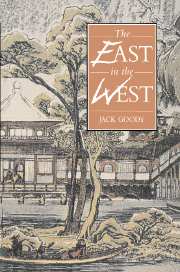Book contents
- Frontmatter
- Contents
- List of figures
- List of tables
- Acknowledgements
- Introduction: the West's problem with the East
- 1 Rationality in review
- 2 Rationality and ragioneria: the keeping of books and the economic miracle
- 3 Indian trade and economy in the medieval and early colonial periods
- 4 The growth of Indian commerce and industry
- 5 Family and business in the East
- 6 From collective to individual? The historiography of the family in the west
- 7 Labour, production and communication
- 8 Revaluations
- Appendix: early links between East and West
- Bibliography
- Index
6 - From collective to individual? The historiography of the family in the west
Published online by Cambridge University Press: 05 June 2012
- Frontmatter
- Contents
- List of figures
- List of tables
- Acknowledgements
- Introduction: the West's problem with the East
- 1 Rationality in review
- 2 Rationality and ragioneria: the keeping of books and the economic miracle
- 3 Indian trade and economy in the medieval and early colonial periods
- 4 The growth of Indian commerce and industry
- 5 Family and business in the East
- 6 From collective to individual? The historiography of the family in the west
- 7 Labour, production and communication
- 8 Revaluations
- Appendix: early links between East and West
- Bibliography
- Index
Summary
In the previous chapter we have seen the major contributions that the family, the extended family and even the wider caste or lineage made to social and economic development in the East. That was the case not only with mercantile activity but also with the development of industrial capitalism, certainly in its early phases. Maintaining the belief that the growth of Western capitalism was marked by individualism, some have discerned in the East a different form of capitalism, based on a collectivist spirit or else upon Confucianism with its emphasis on family ties.
Without wishing to underestimate the differences in the systems of kinship, marriage and the family in the major Eurasian societies, I have earlier (1990) tried to suggest that at the domestic level these are less dramatic than is conveyed by contrasting ‘elementary’ with ‘complex’ (Lévi-Strauss), hierarchical with ‘individualistic’ or egalitarian (Dumont), or yet by the contrasts drawn by many demographic historians, less dramatic that is from the standpoint of contemporary developments in the economy which are not inhibited but often promoted by prevailing family forms.
How is it then that in Europe we have made the opposite assumptions, both about the barriers that the Eastern family has offered to economic advance and about the unimportance of the family in the economic sphere under capitalism? To answer these questions we need to turn to the history and historiography of the family in the West.
- Type
- Chapter
- Information
- The East in the West , pp. 162 - 204Publisher: Cambridge University PressPrint publication year: 1996



